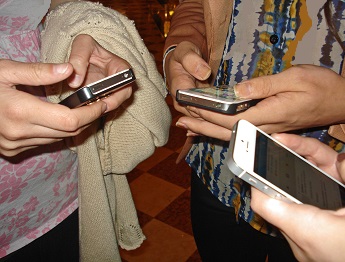While the hottest smartphone games remain popular, previously overlooked titles get a new chance at this time of year.
At this time of year, holiday travelers are on the roads, sitting in airports, or crammed in the seats of planes, buses and trains, heading to various destinations around the world, and mobile gaming has become an important part of that experience.
These mobile games have allowed children and adults alike to remain entertained throughout long wait times.
The trendiest mobile gaming apps are typically easiest for users to find, since they are often featured at the marketplaces from which they can be downloaded. However, for many travelers, who have to spend hour upon hour in waiting areas and in vehicles as they cross the country to be with their loved ones over the holidays, the most popular games aren’t enough. They need more in order to fill that amount of time. This has opened up opportunities for hidden gems to be discovered.
There have been a number of mobile gaming apps that have already started to be found to be diamonds in the rough.
 Among the mobile games that have seen considerable increases in their successes due to holiday travelers are:
Among the mobile games that have seen considerable increases in their successes due to holiday travelers are:
• SimpleRockets (By Jundaroo) – this app is available for Android, iOS, and Windows Phone and is a mobile take on the game designed for PC called the Kerbal Space Program, which was highly popular. It requires players to assemble different components to build a rocket ship that will work and take the user to various parts of the moon, the solar system, and the rest of the universe.
• Auralux (By War Drum Studios) – this is a free strategy game app that is simple in design and rules, but complex in the strategy required. It is available for Android and iOS devices and uses the very basics in military planning to create complicated events for defense and capture.
• Virtual Pool Mobile (By Celeris) – this is a mobile gaming alternative to a PC game that had been designed to provide a billiards playing experience that was physically accurate. In fact, the PC game came with a promise that if the accuracy of its physics didn’t allow the player to improve his or her real game of pool, they would get their money back.
BWild |
December 24, 2014
A recent report has shown that device users appear to be relatively apathetic about efforts to protect their smartphones.
According to the results of a recent study that were published within a report, users of devices based on both the Android and iOS platforms have a higher fraud rate than the typical consumer, simply because they have not taken adequate mobile security precautions in their overall security and password habits.
Despite the fact that consumers are using their smartphones for transactions with personal data, they appear unconcerned.
Personal identifiable information (PII) is being regularly placed at risk by consumers who are using their smartphones and tablets to conduct a range of different transactions, but at the same time, they appear to be apathetic when it comes to actually taking mobile security measures that would help to protect that sensitive data. A Javelin Strategy & Research study has shown that as a result of this consumer apathy, a world of opportunity has been opening up for cyber criminals.
The mobile security report involved the participation of 5,643 American adults in a survey.
 The report on the survey results was entitled “Smartphones, Tablets and Fraud: When Apathy Meets Security”. It was sponsored by Nok Nok Labs, an authentication technology provider. The participants in the study were all from the United States and were all over the age of 18 years.
The report on the survey results was entitled “Smartphones, Tablets and Fraud: When Apathy Meets Security”. It was sponsored by Nok Nok Labs, an authentication technology provider. The participants in the study were all from the United States and were all over the age of 18 years.
The insight offered by this report was primarily to do with the increasing reliance of consumers on their mobile devices in order to be able to stay connected, keep up with their social media, access their email, and conduct various forms of transactions through the internet and a range of different apps. It pointed out that any one of those activities can hand cyber-criminals an opportunity with varying degrees of value in terms of personally identifiable information and account data that could either be misused or sold so that someone else could misuse it.
Regardless of this fact, the study showed that many consumers don’t come nearly close enough to taking the necessary efforts to protect themselves against mobile security breaches. The study revealed that about 6 out of every ten mobile device users use the same password over several different accounts on their device. That, alone, offers considerable exposure to cyber threats.
 Among the mobile games that have seen considerable increases in their successes due to holiday travelers are:
Among the mobile games that have seen considerable increases in their successes due to holiday travelers are:
 The report on the survey results was entitled “Smartphones, Tablets and Fraud: When Apathy Meets Security”. It was sponsored by Nok Nok Labs, an authentication
The report on the survey results was entitled “Smartphones, Tablets and Fraud: When Apathy Meets Security”. It was sponsored by Nok Nok Labs, an authentication 